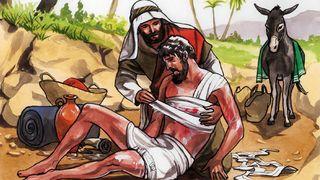Leseplan-informasjon
Encountering God: Cultivating Habits of Faith Through the Spiritual DisciplinesPrøve

Day Three: Worshiping Through Our Actions
The Spiritual Discipline of Worship
When we experience the glory of God and the presence of Jesus, we can’t help but physically respond. And even in those moments when we don’t feel His presence and thus don’t want to worship, this is where the discipline of worship is especially handy. We join in the singing or kneel in surrender or bow in reverence because worship realigns us. We posture ourselves in accordance with what is true whether we feel it or not: God is our loving and sovereign Creator, and we are His creatures.
Read Exodus 3:1-12.
Near the end of Genesis, a famine prompted the patriarch Jacob, his sons, and their families to leave the land of Canaan and move to Egypt. By God’s providence, Jacob’s son, Joseph, had already been living in Egypt for many years and was second in command under Pharaoh, so he was able to provide food and land for his brothers and their families. Jacob’s extended family continued to grow over many generations into what would eventually become the nation of Israel. However, as they grew, so did Egypt’s oppressive rule. The people of God were no longer free to do what God had created them to do.
The Hebrew word for worship in Exodus 3:12 is ‘ābad , and it means to work or to serve.2 Your Bible translation may even use the word serve instead of worship here. The word also carries the idea of working for the Lord in the context of a religious service in the spirit of joyful liberation.3 Simply put, ‘ābad is the kind of worship that is service and ministry-oriented.
The phrase “Let my people go, so they may worship me” is a theme of Exodus, found in 7:16; 8:20; 9:1; 9:13; 10:26.
Throughout the Old Testament, we find that one of the ways the people worshiped God was through active participation. They did certain things that brought Him delight. Much of this worship consisted in walking out the Law of Moses, keeping the feasts, going to the temple, offering sacrifices and tithes, and not turning away from Him to false gods.
PERSONAL TAKE: When you think of all the purposes for which God could have delivered the Israelites from the bondage of Egypt, why do you think this kind of worship was the central reason? Keep in mind the idea of ‘ābad when answering.
Skriften
Om denne planen

Spiritual disciplines are essential to a more vibrant spiritual life and knowing God more intimately. Join Kelly Minter in this 6-day Bible study as she unpacks the biblical foundation for these sacred habits along with...
More









